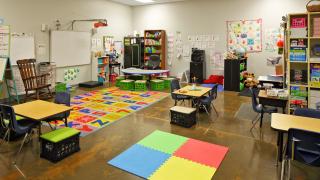Activity Settings, Content, and Pedagogical Strategies in Preschool Classrooms
Do These Influence the Interactions we Observe?

November 3, 2021
Abstract
In light of weaker than expected associations between individual early childhood education (ECE) classroom quality measures and children’s learning observed in the literature, we evaluate the associations between two different perspectives on assessing preschool classroom processes: quality ratings and counts of activity groupings, learning content, and pedagogical approaches experienced by children in the classroom. The study poses that it is feasible that teachers’ planning of programming and timing in classroom activities, content, and teaching and learning strategies may define the context in which higher or lower quality interactions then develop. Using two observational measures of process quality, the Classroom Assessment Scoring System – CLASS (ratings) and the EduSnap Classroom Observation (counts), this paper explores patterns that emerge across ratings and counts in a large, predominantly low-income sample that includes classrooms in New Jersey and Philadelphia. We find more time in choice, literacy, and math and less time in whole group and transitions are associated with higher quality ratings in classrooms. The counts measure also revealed a consistent absence of metacognitive practices across all classrooms regardless of quality ratings. These results suggest that process quality may be dependent on teachers’ decisions on how to structure the day and which content areas to focus on. To this extent, the results suggest that the ECE field should explore measures of quality and classroom process that account for the content and frequency of classroom activities. Supporting teacher practice may involve working not only on supporting their interactions with children, but also on how they plan the day and decide on content and the types of strategies that support children’s learning. The results also indicate that rating protocols on classroom interactions may need to better account for how activities and content may delimit differences in quality observed.
The Authors
Dr. Milagros Nores is the Co-Director for Research and Research Professor at the National Institute for Early Education Research (NIEER). With a profound expertise in early childhood evaluation, informing data-driven policy and programming, cost and benefits of early interventions, evaluation design, equity, and English language learners, she has established herself as a leading researcher in the field of early care and education.
Allison Friedman-Krauss is an Associate Research Professor at NIEER where she is also the Associate Director for Policy Research and Director of the Infant and Toddler Policy Research Center.
Dr. Figueras-Daniel was awarded a Young Scholars Program grant from the Foundation for Child Development to investigate coaching and professional development of Latina preschool teachers working with DLLs. At NIEER, she leads this study as well a project to develop a Latina leadership pipeline in ECE.


